The 16th Oxford Real Farming Conference (ORFC) commenced with an inspiring opening plenary at the iconic Oxford Town Hall. The event brought together farmers, food producers, and advocates for sustainable agriculture, uniting voices from across the globe to cultivate hope and action for a just and resilient food system. It was great to see organic farmers, growers and topics at the heart of things. The tone was set with organic vegetable grower Andy Dibben from Abbey Home Farm kicking off the Conference plenary: “Diversity is one of the most important assets to farming; diverse crops, techniques, routes to market and income streams offer the best resilience to climate change and turbulent times.”
Andy Dibben on Solidarity:
“Farming and food have never had such a high profile, but with this has come division. Many challenges we face extend beyond the farm gate, but in civil society, allies are fighting on behalf of farmers. To overcome these challenges, we must work together. Together, we can deliver this revolution.”
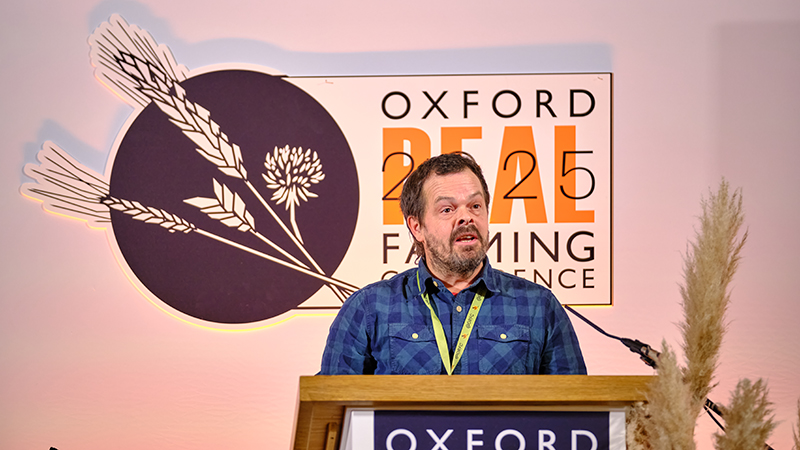
Edu H Nualart on Sovereignty (Words by Paola Laini of La Via Campesina):
“Food sovereignty is about the freedom to decide for yourself and your community the food you eat, the seeds you germinate, and the crops you tend. Sovereignty connects rather than divides—do not stand alone. Globalise the struggle, globalise hope.”
Jim Aplin on Inclusion:
“Just as biodiversity strengthens ecosystems, human diversity strengthens communities. Farmers, who experience neurodiversity at twice the rate of the general public, bring unique qualities and skills to the field. To build resilience, we must create an inclusive space where everyone feels welcome to share and learn.”
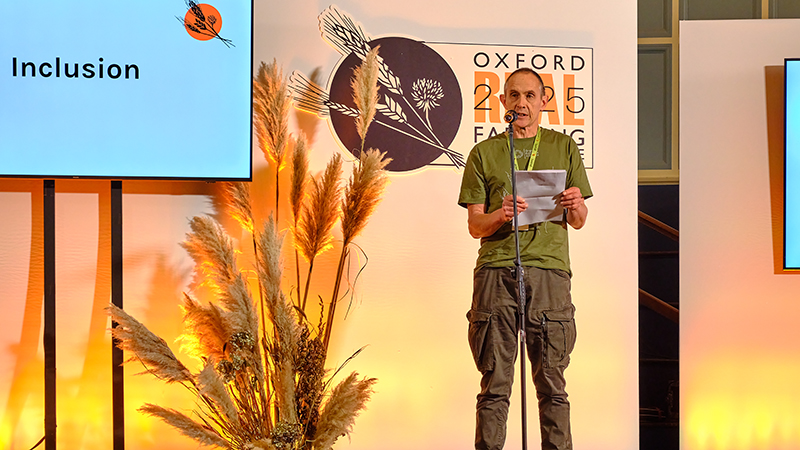
Sandra Salazar on Love:
“ORFC is more than a gathering; it’s a divine movement rooted in the love and power of those who nurture the soil and their communities. This movement is a force for healing and transformation.”
James Rebanks on Resistance:
“When I was young, I thought farmers were old, grumpy men who knew everything. Now I know that the point of farming is to create a sustainable future. We must resist the idea that farming isn’t important. We must resist the broken food system and empower young people, like my 17-year-old daughter, to see a future in the field.”
This session featured ORC’s Matt Smee with Dr Lindsay Whistance and focused on the benefits, challenges and considerations related to the process of adopting tree fodder on farms.The practice of making tree hay predates the making of hay from herb and flower rich meadows and has been used for over three millenia. In Europe and modern farming landscapes the practice has fallen out of favour, however the fodder can provide a vital source of feed and nutrients, add resilience to farm systems and provide a supplementary feed source.
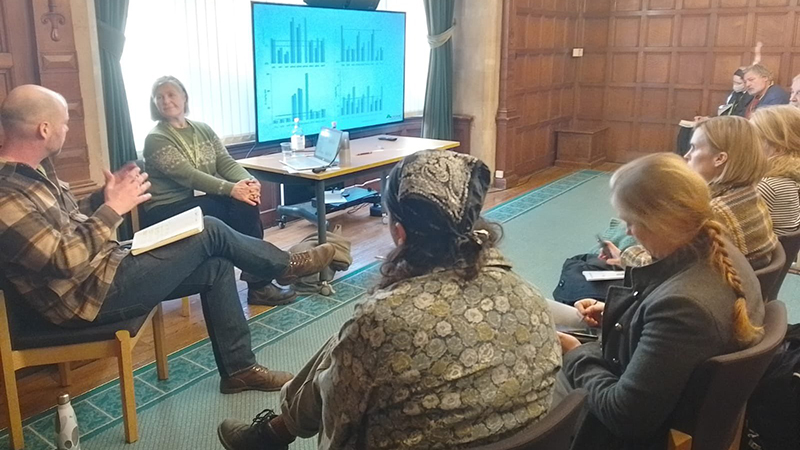
Good access to browse from diverse tree species gives livestock an excellent opportunity to display natural behaviours. Tree hay fodder can be cut and fed fresh or preserved e.g. as hay dropped, dried or chipped. Browse and tree fodder can deliver act as a supplementary feed for all animals or for specific animals at key times. For example, e.g. cobalt requirements for lambs being weaned remains high a time when it drops in the milk pasture levels. and goat willow can be chipped and added to feed to provide the required cobalt levels. Making silage from green willow, grown in coppiced rows, can allow for a higher scale of production compared to tree hay – the process can be mechanised and create nutrient dense feed. Trials of pelleted tree fodder are in early stages but could result in a durable feedstuff where significant production levels could be reached.
ORFC2025 Tree Fodder — What, Why And How: Soundcloud recording
In this session ORC’s Matt Smee was in conversation with Mark Lea of Green Acres Farm as he looked back at four years of living mulches work on his farm in Shropshire.
Living mulches offer an alternative approach for growing arable crops, with research showing the practice can improve nitrogen availability, reduce runoff, increase biodiversity, promote soil health and improve ecosystem services. However, adopting the practice comes with many challenges and considerations.
The session built upon ORC’s extensive long-term research (ORC Living Mulches) into this innovative practice, focusing in on the most practical aspects and providing a detailed exploration of the actions, considerations, and risks that farmers must address at each stage of implementation. The primary aim was to support decision-making processes for farmers seeking to mitigate the range of challenges associated with this novel cultivation technique.
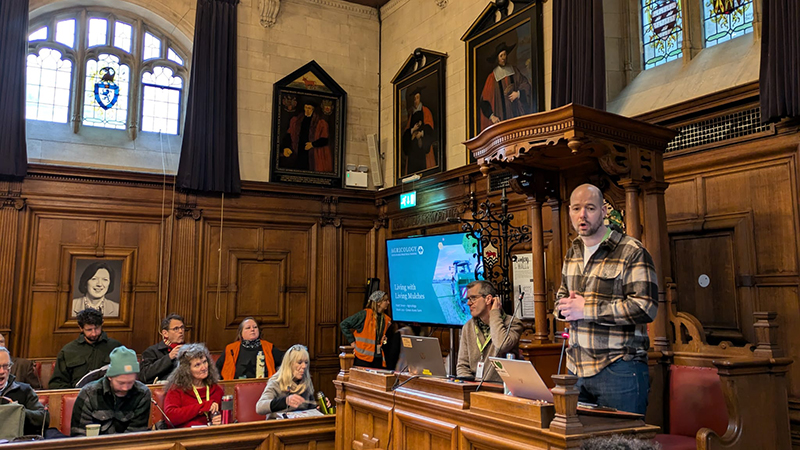
Amongst the many areas covered included the selection of appropriate living mulch species, the critical need to understand how different cereal crops respond to mulch conditions, and the potential complications of straw production when mulches become overly vigorous. These discussions were part of a broader piece of work by the Agricology team to develop comprehensive technical guides on individual agroecological practices. A guide on living mulches, drawing from our research and this session, is scheduled for release in the coming weeks.
ORFC 2025 Living with living mulches: Soundcloud recording
This session chaired by Julia Kirby-Smith (Better Food Traders) brought together independent food retailers Phil Haughton (Better Food, Bristol), Josh Smith (Goodery, Norfolk) and Dan Monks of Unicorn Grocery, Manchester. The workshop kicked off with a reality check, reflecting on a turbulent 12 months for the sector with costs of energy and rents rising. It is difficult to get near the cost levels of supermarkets. What can you cut? Panellists have simplified (‘less is more’) and stripped back as far as they can while recognising the need to value staff and pay living wages.
Value needs to be not just about price. Although it’s difficult to win the battle with supermarkets on price, organic food doesn’t need to cost that much more. Dan Monks said “there is a moral imperative to think about access and who can afford it.” Julia Kirby-Smith highlighted the Marketing Organic: Consumer Insights report by the Organic Research Centre and UK Organic which showed that the consumers most committed to purchasing organic products—dubbed ‘Organic Enthusiasts’—are not necessarily the most affluent. These consumers, who regularly purchase organic products in four or more categories, are highly aware of the benefits of organic options and are willing to spend more for better quality. Many of these consumers are also motivated by health concerns, such as allergies, intolerances, or a desire to follow a healthier diet, and are actively looking to avoid synthetic pesticides and chemicals in their food.
Josh Smith commented: “We are more obsessed with price than our customers. Our customers are more concerned about the experience they get when they open the door, and the driver is smiling at them, and they see the quality of the produce.” Dan Monks added that they sell all their produce loose and “we want our customers to experience joy.” Phil Haughton said that although there are lots of reasons why people shop with them, identifying with their culture is an important factor – people feel good about being in a place and people that cares about what’s important to them. Getting people through the door, past their perceptions of organic being expensive is key, and in-store cafes can facilitate that and enable a store to become part of a vibrant community. Josh said that by crowd-funding campaigns (for their market garden) they learnt that “the people who buy food from us really care about us. We have built social capital by sharing our story.”
All panellists agreed that collaborating with growers is important, and prioritising small local growers, telling their stories and celebrating seasonality. Making points of difference from supermarkets helps, e.g. by selling unforced maincrop rhubarb which supermarkets no longer do. Dan talked about the benefits of collaborative working and pooling resources. A positive example was Kindling Farm, which she said wouldn’t have been able to buy it without the guarantee of the Unicorn market. Now, Kindling is also able to look towards the markets of Liverpool.
The value of positive marketing was stressed; “no-one is going to buy a veg box because they feel guilty, they buy as (the produce) looks amazing, tastes amazing and is produced by the guy down the road.” Dan said that for them education comes before marketing, and they avoid negative messaging and don’t overtly use the word vegan. However, they don’t sugarcoat it when growers experience severe weather events. Josh Smith said that “relationship is resilience” and that we should make everything we do relational rather than just transactional.
For support, advice and more about retailing go to https://betterfoodtraders.org/
A deep dive webinar on the Consumer Insights Report is available on our YouTube Channel
Sustain and Soil Association convened a panel of speakers working across the food supply chain to explore the opportunities to make organic food more available, affordable to everyone and fair to farmers. Hannah Gibbs, Programme Manager for the Bridging the Gap programme at Sustain, chaired the panel with Carol Alyce Adams (Cardiff Met/Cardiff Farmers’ Markets), Sean Ruffell (Organic North), Scottish farmer Phil Swire (Give peas a chance) and Sophie Kirk (Soil Association). Hannah started by challenging the prevailing assumption in the UK around who gets to eat organic food, an assumption that has been promoted by the supermarkets who benefit from branding organic as a luxury item. Polling by ORC and Sustain with UK Organic (Marketing Organic: Consumer Insights) has shown that people on lower incomes are as likely to champion organic as those on higher incomes. Bridging the Gap is demonstrating ways to enable people on a low income to access climate and nature friendly food, focusing on the supply and affordability of organic fruit and vegetables to people who experience low income in cities.
Sophie Kirk gave an overview of the Organic for all vision of the Soil Association developed with other key partners and stakeholders in the organic sector, which is complimentary to Bridging the gap and has been running for more than 12 months. Organic for all is about upscaling organic in a way that makes it affordable, available and accessible to everyone in society. It is centred around three main pillars:
Sophie commented that lots of work is going on in the background but called for everyone involved in the organic sector; retailers, government all have a part to play in making the vision become a reality.
Phil Swire is an arable farmer in Northeast Scotland and converted to organic in 2019. The Good Food Nation Act had an objective to make the route from primary producer to public procurement more accessible. This sparked conversations that led to the ‘Give peas a chance’ pilot project. With support from Soil Association Scotland, Bridging the Gap, the catering and procurement teams in Aberdeen City Council and an army of Cooks in Charge, Phil’s idea of getting his peas into schools has become a reality with the organic green split peas now served in 47 primary schools and 11 secondary schools across Aberdeen every week. The catering service provides 11,000 meals a week.
Carol Alyce Adams talked about the development of Planet Card, a collaboration between Cardiff Farmers Markets, Food Cardiff, and a group of organic growers, social enterprises and community organisations, through Bridging the Gap. The Planet Card has a value of up to £11 per week – enabling holders to switch their normal weekly shop for fruit and vegetables to organically produced versions, without being left out of pocket. can use the card at a choice of organic fruit and vegetable stalls at any of the Cardiff Farmers Markets across the city. The pilot has been successful – people do want to buy organic vegetables but distance from the markets can sometimes be a barrier. Feedback shows cardholders appreciate access to quality produce and they are getting more than they expected. They are also buying more organic products that are not subsidised (e.g. milk). It has also challenged the perception that farmers’ markets are ‘not for them’.
Sean Ruffell introduced Organic North – a members’ run co-operative on a mission to help mend our broken, wasteful and polluting food system. He outlined their guiding principles:
Organic North have also started supplying community pantries across the country and directly to schools, not subsidised but at their normal prices. It works as their produce is fresh and the prices competitive.
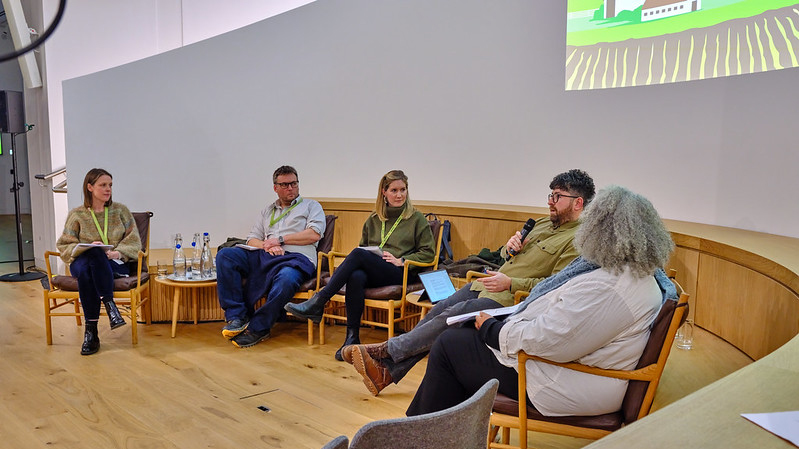
Sophie explained some of the challenges of working with the supermarkets. The Soil Association carried out a small survey of 10 products (UK produced) which showed a Farmgate markup (over conventional) of 27% which increased to 70% for the same products when sold through the supermarkets. A major factor in this is the disproportionate lowering the cost of non-organic as loss leaders below the cost of production. This exaggerates the perception that organic is more expensive. Discussion focused on the logistics of the various schemes, ways of encouraging more people to cook from scratch, and how to ensure Organic for all is truly a sector-wide initiative.
The Organic Growers Alliance and CSA Network brought together three growers who have successfully scaled up their businesses from market garden to field scale production, to discuss the challenges and opportunities. Rita Oldenbourg of Pitney Farm Market Garden, with partner Adam winners of ORC’s Young Organic Farmer/Grower of the Year, commented that small-scale horticulture is experiencing a crisis of viability for horticulture and we urgently need research into mixed horticulture, what systems are viable etc.
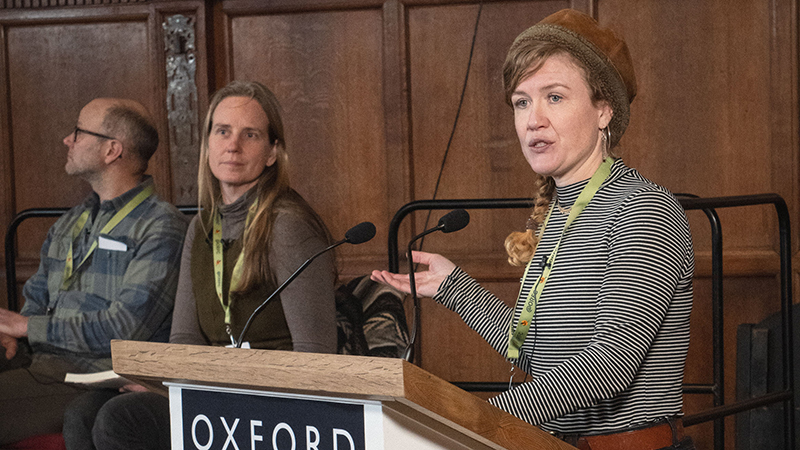
Rita said that they scaled up mainly to increase supply of vegetables during the hungry gap period. By increasing mechanisation they decreased labour hours and increased profit. She says their approach is to scale-down techniques from field scale growers, rather than scaling up from small-scale production.
George Bennett of Sandy Lane Farm in Oxfordshire focused on the organisational aspects of scaling up and shared how their business transitioned from a wholesale model to a steady-income approach through direct sales, enabling them to support a larger team. This shift brought significant personal and operational benefits.
A combined theme from all speakers was the importance of planning and use of spreadsheets, together with accurate data collection and communication. George commented that ongoing observations enable them to make incremental improvements and to streamline operations, while effective communication tools like Trello, WhatsApp groups, Google Sheets, Freshdesk, and the Growing Good veg box platform help the team stay organised and efficient. Rita suggested a simple hack is when invoicing label each crop sale with the succession it has come so can work out yield and £ per m2 for each succession. The data has been surprising and very worthwhile doing and can be compared to your own records and Organic Farm Management Handbook figures, and used for financial forecasting.
Hamish Evans of Middle Ground Growers near Bath concentrated on the economics of up-scaling and described how over a few whirlwind years they have gone from a tenth of an acre and £30K turnover in year one to £300K from 16 acres and providing 4 year-round livelihoods. The key message he said is about optimising rather than maximising.
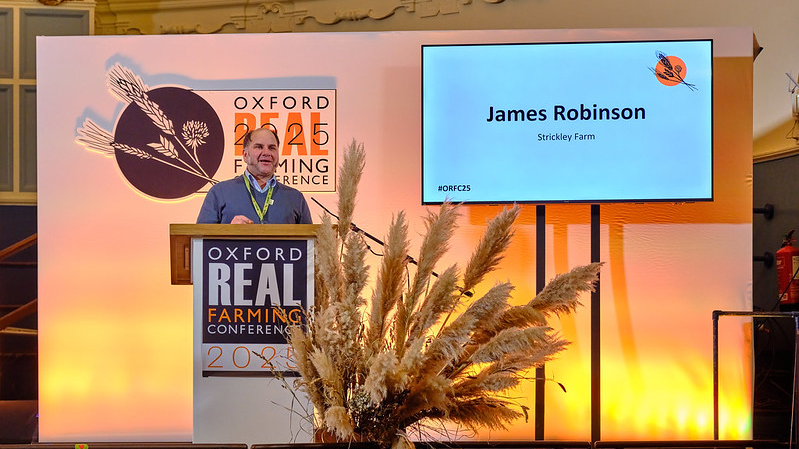
Cumbrian organic dairy farmer James Robinson (Strickley Farm) gave some inspiring reflections in the closing plenary. “As farmers we need to open our minds, be open to criticism and praise and be open to learning… We should share everything collectively – failure, risks and successes…”
